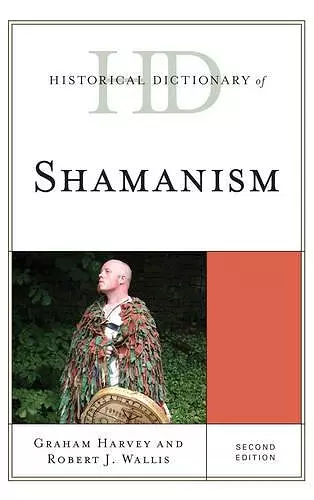Historical Dictionary of Shamanism
Graham Harvey author Robert J Wallis author
Format:Hardback
Publisher:Rowman & Littlefield
Published:15th Dec '15
Currently unavailable, and unfortunately no date known when it will be back

A remarkable array of people have been called shamans, while the phenomena identified as shamanism continues to proliferate. This second edition of the Historical Dictionary of Shamanism contains with examples from antiquity up to today, and from Siberia (where the term “shaman” originated) to Amazonia, South Africa, Chicago and many other places. Many claims about shamans and shamanism are contentious and all are worthy of discussion. In the most widespread understandings, terms seem to refer particularly to people who alter states of consciousness or enter trances in order to seek knowledge and help from powerful other-than-human persons, perhaps “spirits”. But this says only a little about the artists, community leaders, spiritual healers or hucksters, travelers in alternative realities and so on to which the label “shaman” has been applied. This second edition contains a chronology, an introduction, and extensive bibliography. The dictionary contains over 500 cross-referenced dictionary entries on individuals, groups, practices and cultures that have been called “shamanic”. This book is an excellent access point for students, researchers, and anyone wanting to know more about Shamanism.
Harvey and Wallis make a high-quality contribution to the study of shamanism in updating their 2007 edition. Deftly addressing inherent problems in defining the scope of the study of shamanism, this reference work proceeds to admit any and all phenomena that may have been called ‘shamanism,’ including neo-shamanism and scholarly conversations about shamanism. The dictionary provides a succinct snapshot of the current state of knowledge of, and theories about, shamans and shamanic practices, directly addressing and acknowledging the many controversies surrounding the topic. As the authors clearly intend, the work is as revealing about the agendas and nature of academic discourse as it is about the people, cultures, traditions, and practices that have been identified with shamanism. The introduction is clear and insightful, and—unusual for a work structured as a dictionary—the book can be read straight through as a skillful summary of the field of shamanism studies. Its nearly 90-page annotated bibliography is invaluable, covering academic resources alongside works intended for practitioners and their communities. The bibliographic essay is an exemplar of the cogent, stand-alone literature review. * CHOICE *
In this second edition of the dictionary, Harvey and Wallis continue to challenge a western-centric approach to both a global and localized historical movement. . . .The brevity of each entry allows for a breadth of coverage, spanning continents, cultures, and history. Perhaps most impressive about this updated edition is the extensive bibliography, spanning nearly 100 pages in length, delineated by regions and themes. . . .What Harvey and Wallis have accomplished in this updated edition is to show how that identity continues to transform and elude a reductionist characterization. * American Reference Books Annual *
ISBN: 9781442257979
Dimensions: 231mm x 162mm x 35mm
Weight: 726g
392 pages
Second Edition